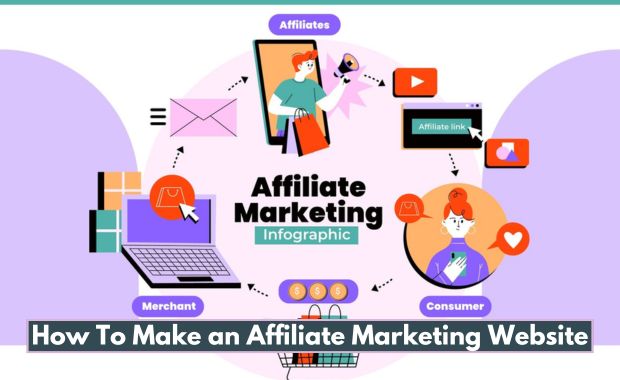Affiliate marketing is one of the most popular ways to earn passive income online. By creating an affiliate marketing website, you can promote products and services, earning a commission for each sale generated through your referral links. This guide walks you through building a successful affiliate marketing website, with actionable steps, tables, and tips to help you create a site that stands out and converts effectively.

1. What is Affiliate Marketing?
Affiliate marketing is a performance-based business model where you earn a commission by promoting products or services through affiliate links. The primary goal is to drive traffic to your affiliate partners and convert visitors into paying customers.
2. Benefits of an Affiliate Marketing Website
| Benefits | Details |
|---|---|
| Passive Income | Earn money while you sleep as visitors make purchases via your links. |
| Low Startup Costs | Requires minimal investment compared to other business models. |
| Scalable Business | Increase revenue by promoting more products and scaling traffic. |
| Flexible Schedule | Work from anywhere and set your own schedule. |
| Diverse Revenue Streams | Partner with multiple affiliate programs to diversify your income sources. |
3. Steps to Create an Affiliate Marketing Website
Step 1: Choose a Niche
Focus on a specific area of interest to target a particular audience effectively. Your niche should: How To Start Dropshipping On Amazon.
- Solve problems or fulfill desires for your audience.
- Have high-demand affiliate products.
- Be something you’re passionate about or knowledgeable in.
Examples of profitable niches:
- Health and fitness
- Personal finance
- Technology and gadgets
- Travel and lifestyle
Step 2: Select a Domain and Hosting Provider
Your domain name should reflect your niche and be easy to remember. Hosting providers ensure your website is accessible online.
| Hosting Providers | Features | Pricing |
| Bluehost | Free domain, 24/7 support, WordPress integration | Starts at $2.95/month |
| SiteGround | High-speed servers, excellent support | Starts at $3.99/month |
| HostGator | Budget-friendly, scalable options | Starts at $2.75/month |
Step 3: Build the Website
- Choose a Website Builder:
- WordPress: Highly customizable and ideal for affiliate marketing.
- Wix: Easy to use with drag-and-drop features.
- Install a Theme:
- Use an affiliate marketing-focused theme like Astra or GeneratePress.
- Set Up Essential Plugins:
- Yoast SEO: Optimize your content for search engines.
- Pretty Links: Manage and track affiliate links.
- Google Analytics: Monitor website performance.
Step 4: Create High-Quality Content
Content is king in affiliate marketing. Create content that attracts, informs, and converts visitors.
| Content Type | Purpose |
| Product Reviews | Provide honest insights into products. |
| Tutorials and How-To Guides | Educate readers on how to use products. |
| Listicles | Showcase top products within a category. |
| Comparison Articles | Highlight pros and cons of similar products. |
Step 5: Monetize with Affiliate Programs
Join affiliate programs relevant to your niche. Some popular options include: How To Make a Dropshipping Website.
| Affiliate Program | Commission Rate | Best For |
| Amazon Associates | Up to 10% | General products across various categories |
| ShareASale | Varies by merchant | Diverse range of products and services |
| ClickBank | Up to 75% | Digital products and online courses |
4. Tools for Affiliate Marketing Success
| Tool | Purpose | Pricing |
| Ahrefs | Keyword research and SEO analysis | Starts at $99/month |
| Canva | Create visuals and banners | Free and Pro options available |
| SEMrush | SEO and competitor analysis | Starts at $119.95/month |
| Mailchimp | Email marketing | Free for up to 500 contacts |
5. Tips for Driving Traffic
- Leverage SEO:
- Conduct keyword research to target high-volume, low-competition keywords.
- Optimize titles, meta descriptions, and content for SEO.
- Use Social Media:
- Share your content on platforms like Instagram, Facebook, and Twitter.
- Engage with your audience to build a community.
- Build an Email List:
- Offer a free resource (e.g., eBook, checklist) to collect email addresses.
- Send regular newsletters to promote your affiliate products.
- Run Paid Ads:
- Use Google Ads or Facebook Ads to drive targeted traffic to your site.
6. Common Mistakes to Avoid
- Promoting Irrelevant Products: Stick to products aligned with your niche.
- Ignoring Analytics: Regularly review performance metrics to optimize your strategy.
- Overloading Ads: Too many ads can detract from user experience.
- Neglecting Mobile Optimization: Ensure your site is mobile-friendly for a broader audience.
By following these steps, you can build a successful affiliate marketing website that attracts visitors and generates consistent income. For more insights and detailed guides, visit BloggingKK.org.